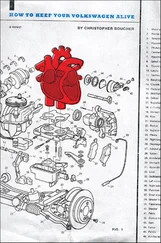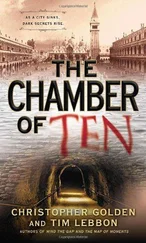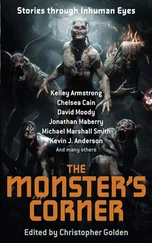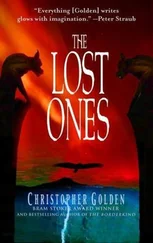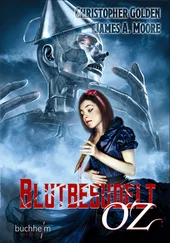“You hate everyone !” I shouted.
My Mom pointed her finger at me. “I’ll be gone someday,  —”
—”
“What’s that supposed to mean?”
“—and then you’ll wish you were nicer to me.”
Shortly after that, two clauses got in a fight in the margin across the street. This would happen every once in a while — you’d hear the wild, high squeal and pitter-patter of language chasing language through trees. That day, I ran outside just in time to see the clauses scamper across Converse and tussle on the treebelt, ripping up the page right in front of our house.
My mother heard the commotion from her gym and stormed out through the garage door. “Oh, Christ !” she said.
By then the sentences were gone.
“What the hell happened to the lawn?”
Neither the Reader nor I said anything.
“Did you do this?” Mom asked the Reader.
“Me?” you said. “No.”
“  ?” said my Mother.
?” said my Mother.
“We were just standing here,” I said.
“Don’t lie ,  ,” she said.
,” she said.
“I’m not,” I said. “It was two sentences fighting across the street.”
“Piece of crap ,” she said. I don’t know if she was talking to the sentences or to me.
My Mom was changing — being replaced by a sadder, more angry version of herself. She stopped eating — eating anything , I mean. She grew resentful about work and my Dad’s minimal meaning, and impatient with all the junk my sister kept around the house and with my perpetual lateness. One time? She was supposed to pick me up from school, and I was a few minutes late as usual. When I went out to the circle and looked for her car, I saw the Cloudy Fart driving away down Grassy Gutter. I waved my hands and ran down the sidewalk shouting. And I know she saw me — I saw her eyes in the rearview mirror. But she turned down Williams and drove away, and I had to walk home in the snowy cold.
My mom wasn’t the only one souring, though. About three months after I found “I am.” in fact, the happiness taps in our home faltered and sputtered and ran dry. My sister noticed it first, when she turned on the happiness faucet in the backyard — to wash a dead icebox that she’d found at the flea market — and the faucet coughed and spit. As a landlord, my Dad knew a lot about happiness — where the shutoffs were, how to check the gauges, how to increase the feed. When he read the meter, though, he saw that the supply was low.
“Well?” said my Mom from the top of the stairs.
My Dad checked the expansion tank. When he shook it, you could hear a pinging inside.
“There’s air in the tank,” he said.
“Ralph?” hollered my Mom.
“It’s empty!” my Dad called up.
“I’m calling the DPWC,” my Mom said.
The Public Works Cones confirmed it: our whole neighborhood was out of happiness. There was a problem with a conversion facility on Tanglewood, they said, and they didn’t know when it’d be up and running again. For the time being, the Cones said, we all needed to make do with little or no happiness.
As soon as my Mom hung up the phone, my Dad got into his truck and drove to the store for some bottled joy. He returned empty-handed an hour later, though. “You should have seen the lines,” he said.
We were downtrodden — just plain sad —all that week. My father ignored calls from tenants and spent the afternoons drinking hard cider on the porch. My sister gave up on the icebox she was trying to restore and just put it out on the curb. Me, I was so sluggish I couldn’t do anything — not even read or walk “I am.” He started peeing on the rug in the corner of the living room and no one even said anything about it.
My mother handled the sadness differently: she spent most of the weekend in her home gym. This was right around the time when my Mom became fascinated with the Mothers — the highly trained, heavily armed militia group that lived in Nests perched in high trees, flew in formation above Appleseed, and descended at the first sign of trouble. All of a sudden, the Mothers were all my Mom talked about — how heroic and brave they were, how thankful the town should be for their protection.
Reader: Protection from what ?
From intruders of any kind: thoughts sent from other towns to confuse us, meaning-scammers, traveling rust or decay, dangerous words or sentences, etceteras, et cetera. If they picked up a threat or imbalance in some history or exposition, they’d take the long, difficult flight back through the years to the page where that imbalance appeared. According to my Mom, the Mothers would revise right there on the spot: change a word, a sentence, a whole paragraph , even, if they needed to.
My father scoffed at all this. He didn’t dispute the Mothers’ presence — you could often see them, plain as ink, floating over the pages in their flightskirts and goggles — but he thought their reputation was exaggerated. Their brochures boasted of training in aikido, thought-stopping, judo, size-changing, and karate — they bragged about victories in secret wars, saving Appleseed from near-coups and future infestations, changing the histories of disease and oppression. My Dad had his doubts. “No one is that strong or that tough,” I heard him tell my Mom once.
“The Mothers are,” she said, shoving a brochure in his face.
My Mom never explained to me why she wanted to be a Mother, but I had my theories. When my Mom was younger, she was tormented by eating disorders. She’d told me the stories — how, at school, they poured loathing in her locker, badgered her with fakeprayers, spread fictional rumors about her. Once, two disorders cornered her on her way home from school and beat my Mom so badly she missed a week of school.
It was a Mother who saved her, my Dad said. One day, my Mom was in a knockdown-dragout with a gang of disorders when a Mother dropped down from the sky and unfurled her warskirt. Those disorders landed in the hospital with fractured everythings — fractured egos, fractured goals, fractured sorrow.
You couldn’t just be a Mother, though — you had to be chosen. They hadn’t recruited for over five years, so my Mom was training for the day they opened the books again. She worked hard: she fasted; learned to box; bought a video about levitation and another about size-changing, which taught her how to think herself taller or shorter at will. She took meaningful courses on seeing the future and revising the past.
Once, when my Mom was at work, I found her videos and asked the TV to show one to me. I thought I’d impress my Mom if I could learn how to change size like she did. Just ten or fifteen minutes into the first taped lesson — how to reduce — my Mom walked in from work. “What are you doing?” she said.
I was about the size of a Converse hi-top. “Nothing,” I said.
She turned off the TV.
“You’ve caused enough trouble already,” she said. “Or will in the future.”
“What do you mean?” I said.
She shook her head and held up her hands. “I’m just saying,” she said, “you can’t go around taking other people’s things,  .”
.”
“O K ,” I said.
The following Monday, we received a general prayer that the happiness would be restored. When we turned the faucets on that afternoon, though, they spat out happiness caked with sadness and the carcasses of doubts. I remember the four of us standing in the kitchen, waiting for the pipes to clear. My Dad let the happiness run for a few minutes, and then he poured some in a glass and held the happiness up to the light.
Читать дальше
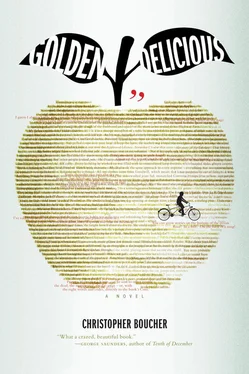
 —”
—”
